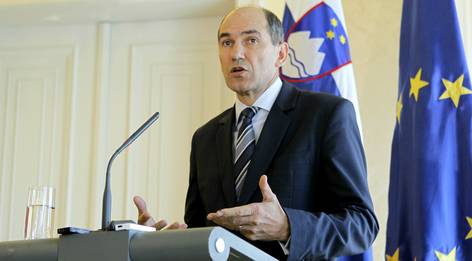NEWS
Information on the initiative for strengthening the implementation of the Convention on the Prevention and Punishment of the Crime of Genocide
In the starting points for the participation of the delegation of the Republic of Slovenia at the 67th United Nations General Assembly Session, the Government of the Republic of Slovenia decided that the Prime Minister of the Republic of Slovenia, Janez Janša, shall present the initiative for strengthening the imlplementation of the “Convention on the Prevention and Punishment of the Crime of Genocide” in his speech at the session. The initiative coincides with the efforts of Slovenia to secure the support of its candidacy for the United Nations Human Rights Council for the period 2016-2018.
The Prime Minister has officially discussed the initiative with the Secretary-General of the United Nations, Ban Ki-moon, on the occasion of Ban Ki-moon’s recent visit to Slovenia. In addition, he has had several informal discussions with different heads of state. He will hold another meeting with the secretary-general of the United Nations next week in New York to talk about this topic. Early this week, the Prime Minister of Slovenia issued a special letter to his colleagues across the globe to underline limited possibilities of the international community to efficiently prevent the occurrence of genocide and other mass atrocities. He invited them to support the idea of undertaking the upgrade of legal remedies available to the United Nations and of forming a system of preventive actions and measures to efficiently prevent such mass violations of human rights in the future.
For three years, Janez Janša, the Prime Minister of the Republic of Slovenia, has presided to a broad international civil society Initiative in the framework of the international Institute for Cultural Diplomacy, which strives to continue the historical work of Raphael Lemkin, Polish lawyer of Jewish origin, who is the most deserving person for the adoption of the Convention on the Prevention and Punishment of the Crime of Genocide in 1948 and its implementation in 1951. In his opinion, civil initiatives and political endeavours aimed at bringing into force and strengthening this Convention should also be followed by the development of international legal practice, particularly in the light of current events in the international community where we witness atrocities and the most severe violations of human rights on a daily basis.
The proposed Initiative has been signed so far by a great number of international civil society organisations, distinguished international law experts and other supporters from all continents (www.culturaldiplomacy.org/index.php). The Initiative with the signatures of a part of its supporters was also published in today's (22 September 2012) global issue of International Herald Tribune. Therein the President of the Initiative Janez Janša and other initiators call on the countries members of the United Nations, on regional and sub-regional organisations and on the UN system to develop an effective strategy for the prevention of genocide and other mass atrocities. To this end, they propose to establish an intergovernmental forum of countries members of the UN that are of a similar mind, so that they would draw up a UN resolution that will give a clear mandate for the preparation and adoption of a protocol for the implementation of the Convention, and/or other appropriate legal instrument which would enable the international community to respond quickly and offer zero tolerance for any acts leading to genocide and other mass atrocities.
The Initiative is complementary to other already existing similar initiatives in the international community in this area and the implementation of them; it is based on the cooperation of civil society and intergovernmental factors with the UN system in seeking and formulating the most effective solutions. The formal presentation of the Initiative will be followed by further civil society and diplomatic activities for the purpose of its implementation.
More information on the history and former development of this Initiative is available on the aforementioned website of the Institute for Cultural Diplomacy in Berlin.
The existing Convention on the Prevention and Punishment of the Crime of Genocide is also available at: untreaty.un.org/cod/avl/ha/cppcg/cppcg.html.





